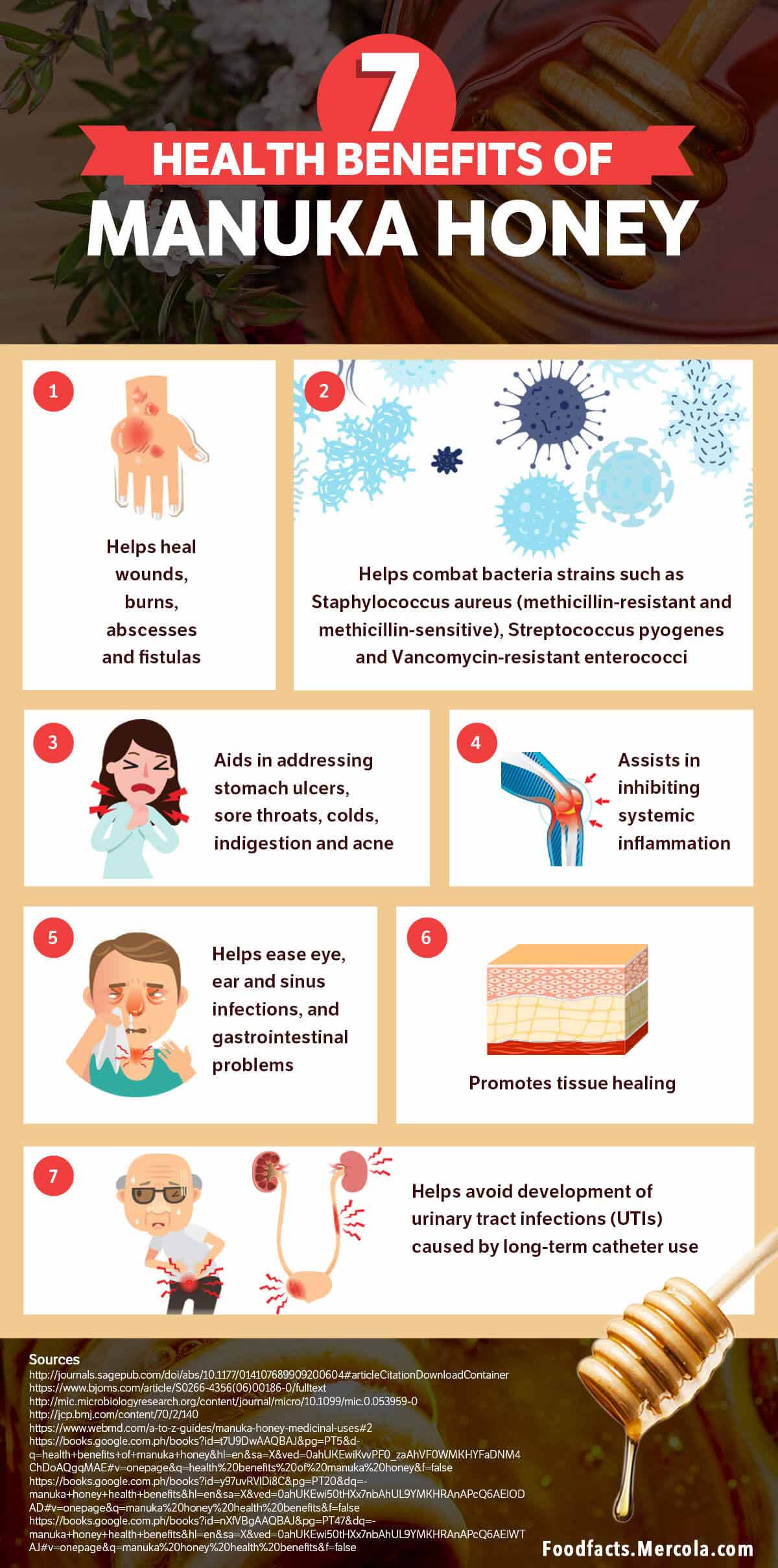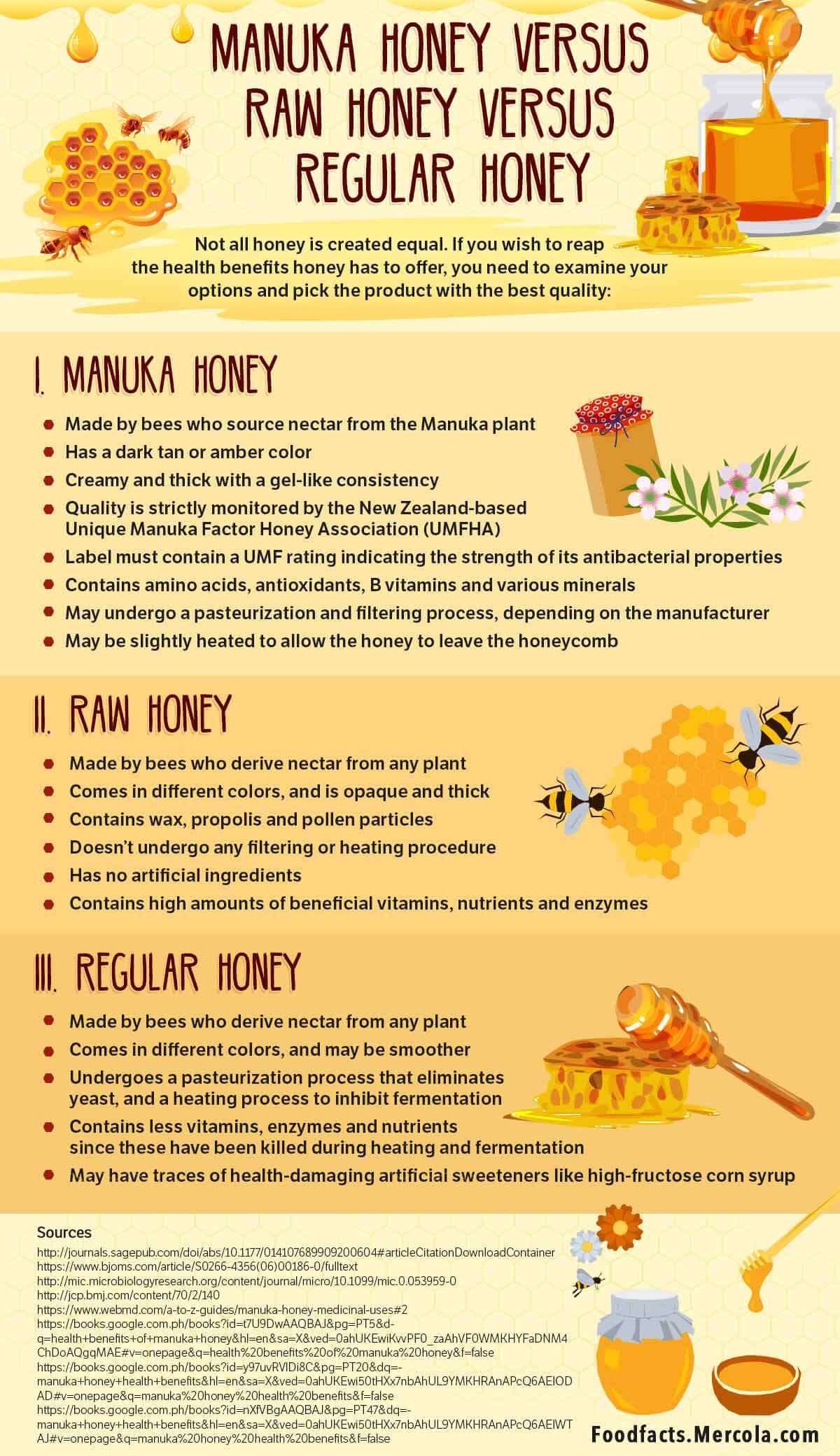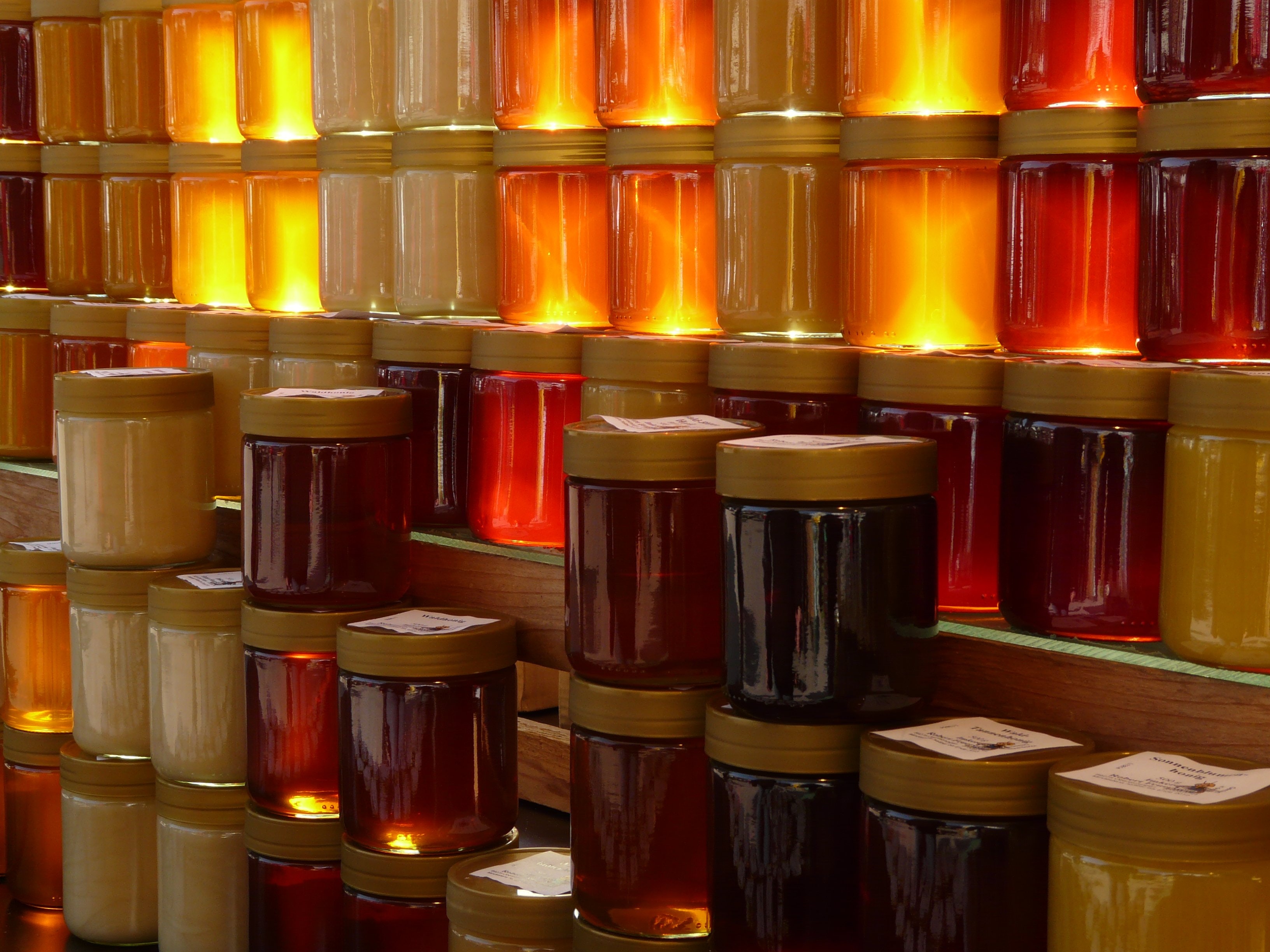My daughter started to feel unwell two days ago. Headache, stomach ache and sore throat. She is very similar to me in the sense that if she has a couple of late nights her Immune system will suffer and it will show in her getting a cold sore or cold symptoms. Yesterday (Monday) she wasn’t well enough to go to school and apart from me giving her Zinc (after meals), Echinacea blend in liquid form she also started having Manuka honey to help with her sore throat. We always get a big jar of Manuka honey before winter as I find it’s invaluable for coughs and sore throats. It doesn’t taste the same as regular honey and the many benefits it has are well worth the cost of this amazing honey. Last year I added raw garlic cloves to a jar of it and let the garlic sit there for a few weeks. The kids didn’t mind the taste and I felt this combination was even more beneficial than Manuka Honey alone.
The Health Benefits of Manuka Honey
Out of the 300 types of honey available today,1 Manuka honey has been generating the most buzz for its benefits that you might not find in other varieties of honey. Continue reading to learn what makes Manuka honey stand out, and how you can use it to your advantage.
What Is Manuka Honey?
Manuka honey is produced by bees that tend to flowers of the Manuka plant (Leptospermum scoparium) that grows in New Zealand.2 Manuka honey is available either raw or processed.3
Compared to other types of honey, Manuka honey has been shown to be more potent and health-boosting because of its higher methylglyoxal (MG) concentration. This particular compound helps contribute to Manuka honey’s benefits (more on this to come later).
Although its steep price tag can throw some people off,4 various studies over the years have proven that Manuka honey is quite beneficial for you, and is definitely worth the cost.
Health Benefits of Manuka Honey

Manuka honey may help soothe sore throats, protect your body against the common cold 55 and assist in relieving sinus infections.6 It can also help address eye, ear and sinus infections, and even diabetes, although more information is needed to determine this link.7
Animal studies have shown that Manuka honey has antioxidant capabilities 8 that may provide protection against oxidative damage by neutralizing free radicals.9 Other research also proved that Manuka honey exhibits anti-inflammatory properties that may aid in lowering risk for tissue damage and bacterial infections.10,11
Manuka honey may improve oral health by reducing dental plaques and alleviating gingivitis.12 It can also work wonders for the digestive system, as it may relieve indigestion 1313 or gastric reflux,14 and help alleviate gastric ulcers.15,16 A 2008 Phytotherapy Research animal study revealed that rats who were induced with inflammatory bowel disease improved significantly after being treated with Manuka honey.17
Arguably, one of Manuka honey’s most notable health benefits lies in its ability to target and eliminate around 250 clinical bacterial strains such as MRSA, MSSA, VRE and helicobacter pylori.18
Researchers from the University of Southampton in the U.K. discovered Manuka honey’s potential in lowering infection risk and helping prevent biofilm (pathogenic bacterial colonies) development on catheters and other medical devices. Manuka honey was combined with bacterial cultures such as Escherichia coli (E.coli) and Proteus mirabilis, both linked to urinary tract infections (UTIs). According to the researchers:19,20
“After 72 hours … the highest dilution of honey — 16.7 percent — had reduced the stickiness of bacteria by 77 percent, and all other dilutions had reduced stickiness by at least 70 percent by that point.In terms of biofilm growth, the researchers found all concentrations of Manuka honey had reduced growth after [four] hours; the highest concentration decreased growth by 38 percent after [four] hours, increasing to 46 percent after 24 hours.”
Manuka honey can also be good for your skin. If you’re suffering from acne, Manuka honey’s anti-inflammatory and antimicrobial effects may work on your pimples by healing them and inhibiting formation of blemishes.21
Research has also shown that Manuka honey may heal eczema-affected skin,22 while a 2012 Archives of Gynecology and Obstetrics article revealed that a combination of bee honey and yogurt worked better than antifungal agents in addressing vulvo-vaginal candidiasis in pregnant women.23 Lastly, Manuka honey can also be helpful during a pregnancy, since it can:24
- Help counteract fatigue and heartburn
- Assist with healing cuts and scrapes, fighting bacteria in the wound and maintaining wound cleanliness
- Aid in addressing colds and sore throats
- Provide instant burst of energy especially during labor when added to hot water
What Makes Manuka Honey Special in the First Place?
What sets Manuka honey apart from other honey varieties are its potent compounds that can help deal with infections and boost the body’s overall health.25
Manuka honey has high methylglyoxal (MG) levels, and while this compound is also found in other types of honey, their MG content is quite low. In Manuka honey, MG develops after the conversion of dihydroxyacetone, a compound present in the nectar of Manuka flowers. A higher MG concentration can lead to increased antibiotic capabilities.26
Manuka honey’s potency is rated via the Unique Manuka Factor (UMF) rating.27 Dr. Peter Molan, a professor from Waikato University in New Zealand,28 discovered that some strains of the Manuka plant contained highly effective antibacterial properties. Molan coined the term “UMF” to describe these properties, although no one has yet been able to determine the exact substance/s responsible for this honey’s antibacterial potential.29
Manuka Honey’s Multiple Uses
You can take Manuka honey orally, but it also has topical applications, such as:
- Wound dressings to help treat wounds, ulcers or burns:30,31 Manuka honey is usually placed on top of wounds or burns to speed up their healing. Before applying this type of honey to wounds however, consult a physician or health professional first. Sterilized and laboratory-tested Manuka honey must be used,32 and not typical Manuka honey.
- Eye treatments to assist with healing related conditions:33 There is potential for Manuka honey eye cream to help ease blepharitis 34 (inflammation of the eyelids 35) and conjunctivitis or pink eye.36
- Face masks to improve skin: A Manuka honey mask can have antioxidant and hydrating properties that may boost skin elasticity and collagen production, and assist the skin in achieving a nice glow.37
- Spot treatments to help scars fade: Manuka honey’s anti-inflammatory and antimicrobial properties play a role in eliminating skin blemishes.38
Comparing Manuka Honey Versus Raw and Regular Honey

You may be wondering how you can distinguish Manuka honey from other types of honey, like raw and regular honey. The honey’s source is a key difference: Manuka honey specifically comes from the Manuka plant found in New Zealand.39 Raw and regular honey are made by bees that source nectar from various plants.40,41
Manuka honey’s physical appearance is different too. This type of honey can either be dark tan or amber, is creamy or thick, and possesses a gel-like consistency,42 although it may liquidize once it’s stirred.43 Raw honey is unique as it can include particles of wax, propolis and pollen,44 is opaque and thick,45 and may come in various colors.46 Lastly, just like raw honey, conventional store-bought honey comes in various colors, although the texture may be smoother.47
These types of honey, after being extracted from the honeycomb, are also processed differently. The final steps done by producers play a big role in the honey’s quality and potential benefits:
- Manuka honey: Some brands may pasteurize and filter their honey. While these processes remove wax and other particles, important components like propolis and bee pollen may be eliminated as well, if the filter used is very fine.48 High-quality Manuka honey also contains amino acids, B vitamins and minerals like calcium, copper, iron, potassium, sodium and zinc.49
- Raw honey: This type of honey isn’t heated or filtered, does not contain any artificial ingredients, and retains health-boosting vitamins, nutrients and enzymes.50,51
- Regular honey: Avoid regular honey, since it’s typically pasteurized to kill yeast and heated to prevent fermentation,52 eliminating vitamins and enzymes, and lowering the honey’s nutritional content.53 Regular honey might also contain antibiotics and artificial sweeteners like high-fructose corn syrup (HCFS) that can damage your health in the long run.54
Manuka Honey Nutrition Facts
What’s interesting about Manuka honey is that it has less sugar in every 1 tablespoon serving, compared to other types of honey. Check this nutrition chart for more details:
| Amt. Per Serving |
% Daily Value* |
|
|---|---|---|
| Calories | 83 | |
| Calories from Fat | 0 | |
| Total Fat | 0 g | |
| Saturated Fat | 0 g | |
| Trans Fat | ||
| Cholesterol | 0 mg | |
| Sodium | 0 mg | |
| Total Carbohydrates | 20 g | |
| Dietary Fiber | ||
| Sugar | 0 g | |
| Protein | 0 g | |
| Vitamin A0% | Vitamin C | 0% |
| Calcium 0% | Iron | 0% |
*Percent Daily Values are based on a 2,000 calorie diet. Your daily values may be higher or lower depending on your calorie needs.
However, this doesn’t give you the liberty to consume as much Manuka honey as you want. Honey, albeit beneficial, still contains sugar that gives it its very sweet taste.
Because of this, excessive honey consumption can worsen pre-existing insulin resistance and other related conditions. To fully take advantage of Manuka honey’s (or even raw honey’s) benefits, it would be highly ideal to avoid ingesting it in copious amounts. Instead, use it in moderation, as to avoid worsening insulin resistance.
Easy Manuka Honey Recipe to Try at Home
Ginger, Lemon & Manuka Honey Tea Recipe
Honey can be added to salad dressings or meat marinades, used as a topping for yogurt, or mixed in coffee or tea.55 This healthy tea recipe from Goop uses only three ingredients, but you can derive a huge number of health benefits and flavors from it:56
| Ingredients: | ||
| 1/2-inch ginger, peeled and sliced | 1/4 lemon | 1 teaspoon Manuka honey |
Procedures:
- With the back of a knife, smash ginger slices to release the flavor. Add to a teacup.
- Add teaspoon of Manuka honey and pour in hot water. Let steep for two to three minutes, then add juice of lemon.
Where to Buy Manuka Honey
You can look for Manuka honey at local health stores, or in reputable health websites. Check for the UMF label that measures substances like DHA, leptosperin and methylglyoxal.57
This rating is spearheaded by the Unique Manuka Factor Honey Association (UMFHA) based in New Zealand, and entails an annual inspection of both producers and honey produced. As Epicurious notes, a higher number on the label means that the honey is more health-boosting.58 Ideally, genuine Manuka honey should pass the following criteria:59,60
| Honey label must indicate its lot or batch, and must be packed and labeled in New Zealand. | The honey is from a New Zealand-based company that’s licensed to use the trademark “UMF.”61 |
| The product must be labeled as honey (not other alternative names), and should include the address of the manufacturer, packer or vendor. | The honey jar or container must include a nutrition information table according to standards set by the New Zealand government. |
| The honey shouldn’t have therapeutic claims, such as “Non-Peroxide Activity (NPA),” “Total Peroxide Activity (TPA),” “Peroxide Activity (PA),” “Total Activity (TA)” or “Active.” |
The label should possess both the rating number and trademark “UMF” that claims it’s Manuka honey.62 |
| A best before date can be provided although this isn’t applicable for honey products because of their two-year shelf life. | The honey jar or container must include a nutrition information table according to standards set by the New Zealand government. |
Manuka Honey Side Effects To Be Wary Of
Although you can benefit from Manuka honey, there are side effects that you should be aware of:63
- Allergic reactions, especially among people who are allergic to bees
- Risk of increase in blood sugar levels (especially if used in high amounts)
- Possible interactions with certain chemotherapy drugs
Manuka honey should not be given to babies under 12 months old. Honey is a known source of bacteria spores that can cause botulism,64 a rare and serious disease triggered by toxins from the Clostridium botulinum bacteria strain.65
As mentioned earlier, Manuka honey must be eaten in moderation. However, diabetic or prediabetic patients must refrain from consuming Manuka honey on a daily basis or consider eliminating it from their diet altogether. The high levels of MG and glucose, as seen in a 2006 Diabetes article, may prevent insulin-induced signaling and cause diabetes and its complications.6
References:
- 1 Beer Judge Certification Program, “Honey Floral Source Guide”
- 2,6,40 “Asthma Solved Naturally: The Surprising Underlying Causes and Hundreds of Natural Strategies to Beat Asthma,” December 12, 2013
- 3,49 Raw Manuka Honey, “What is Active Raw Manuka Honey”
- 4,29,59,62 Epicurious, June 22, 2017
- 5,28 The Huffington Post, September 29, 2017
- 7,16,26,30,64 WebMD, October 24, 2017
- 8 Glob J Health Sci. 2012 Oct 10;4(6):191-6
- 9 Clinics (Sao Paulo). 2013 Nov; 68(11): 1446–1454
- 10 Phytother Res. 2012 Nov;26(11):1620-5. doi: 10.1002/ptr.4618. Epub 2012 Feb 23
- 11 Innate Immun. 2012 Jun;18(3):459-66. doi: 10.1177/1753425911422263. Epub 2011 Oct 6
- 12 J Int Acad Periodontol. 2004 Apr;6(2):63-7
- 13 “Healthy Honey Cookbook: Recipes, Anecdotes, and Lore,” February 1, 2013
- 14 “Honey in Traditional and Modern Medicine,” October 29, 2013
- 15 J R Soc Med. 1994 Jan;87(1):9-12
- 17 Phytother Res. 2008 Nov;22(11):1511-9
- 18,27 “CANINE NUTRIGENOMICS: THE NEW SCIENCE OF FEEDING YOUR DOG FOR OPTIMUM HEALTH,” December 30, 2014
- 19 Journal of Clinical Pathology 2017;70:140-144
- 20 Medical News Today, September 27, 2016
- 21,38 “Beekeeping: A Step-by-Step Guide to Setting Up and Maintaining a Hive,” 2011
- 22 Nat. Prod. Bioprospect. (2013) 3: 121
- 23 A.S. Arch Gynecol Obstet (2012) 286: 109
- 24 “Super Foods for Pregnancy: Delicious Ways to Meet Your Key Dietary Requirements,” May 4, 2015
- 25 Eater, August 25, 2016
- 31 Ostomy Wound Manage. 2002;48(11):28-40
- 32 DermNet NZ, 2005
- 33 Clin Exp Optom. 2015 Sep;98(5):464-72
- 34 Clin Exp Optom. 2015 Sep;98(5):464-72
- 35 BMJ Open Ophthalmol. 2017 Aug 4;1(1):e000066
- 36 Mayo Clinic, April 21, 2018
- 37 “Natural Cures For Dummies,” March 24, 2015
- 39 Medical News Today, May 29, 2018
- 41 Australian Honey Bee Industry Council, “How Bees Make Honey”
- 42 Saudi Journal of Biological Sciences, Volume 24, Issue 1, January 2017, Pages 180-191
- 43 “Taste of Honey: The Definitive Guide to Tasting and Cooking with 40 Varietals,” June 4, 2013
- 44 Food and Agriculture Organization of the United Nations, “Honey 1”
- 45 “The Benevolent Bee …,” July 15, 2017
- 46 Spoon University, June 12, 2017
- 47 The Kitchn, March 20, 2015
- 48,56 Medical News Today, February 14, 2018
- 50 “The House of Vegannatti Food Mantra Guide 101,” September 27, 2016
- 51 “Spoonfuls of Honey: A Complete Guide to Honey’s Flavours & Culinary Uses, With Over 80 Recipes,” November 6, 2014
- 52 Organics, “Differences Between ‘Honey’ and Raw Organic Honey
- 53 International Journal of Food Properties, 10:1, 127-143
- 54 Paleo Hacks, “Raw Honey vs Processed Honey”
- 55 Organics, “Differences Between ‘Honey’ and Raw Organic Honey
- 57 Goop, Ginger, Lemon & Manuka Honey Tea
- 58,63 Unique Manuka Factor Honey Association, “Grading System Explained”
- 60 Better Nutrition, September 1, 2016
- 61 Ministry for Primary Industries, “Download ‘How to Meet Mānuka Honey Labelling Requirements’”
- 65 “Improve Your Health With Honey,” The Book Factory
- 66 Mayo Clinic, June 13, 2015
- 1 Diabetes. 2006 May;55(5):1289-99
https://foodfacts.mercola.com/manuka-honey.html

